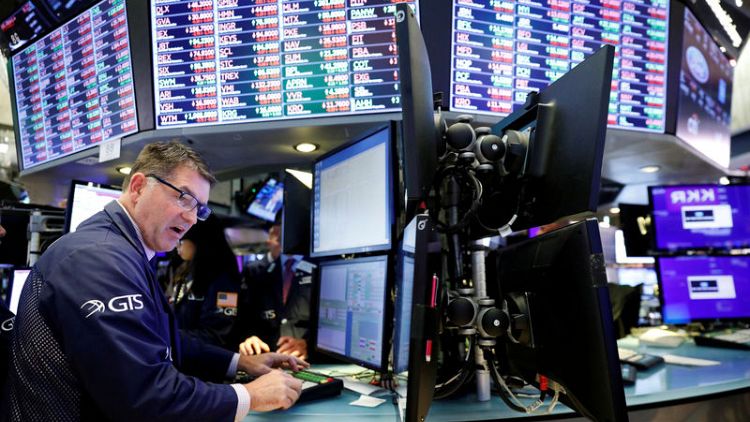LONDON (Reuters) -
1/TRADE TENSION HEADACHES
Washington's latest accusation that China is dumping wooden cabinets and vanities on U.S. shores sums up the mood between the two warring sides as they head into another round of high-level discussions.
The talks in Washington on Oct. 10-11 will be led from the Chinese side by President Xi Jinping's top economic adviser, Vice Premier Liu He. Investors' expectations are low, given Trump's penchant for impulsive forays in the nearly two years of on-again, off-again negotiations.
His latest manoeuvre, which came just before China went on a week-long break to celebrate the 70th anniversary of the founding of the Communist Party, was a threat to delist Chinese companies from U.S. stock exchanges. Beijing has said this would be a radical escalation of trade tensions.
Meanwhile, upcoming Chinese data should show the monetary pumps are working hard at softening the economic blow from the trade war. Credit growth and money supply have been rising, despite authorities' repeated insistence they won't throw too much money at the problem.
-China is dumping wooden cabinet imports in U.S. -Commerce Department
-WTO slashes forecast for trade growth as conflicts mount
-China urges 'calm and rational' resolution to U.S.-Sino trade war
For a graphic on China TSF, GDP and markets:
https://fingfx.thomsonreuters.com/gfx/mkt/12/6912/6843/Pasted%20Image.jpg
2/FED VS WALL STREET
A week of ugly U.S. manufacturing and services sector reports and the growing clamour to impeach President Donald Trump have done little to boost confidence for a market now pricing in an increased risk of recession. The Washington circus may remain a sideshow, however, given the long odds that a Republican-controlled Senate would agree to remove Trump from office.
Instead there's greater focus on the economic impact of Trump's trade wars than the political fallout from his digging of foreign dirt on Joe Biden. Barring any political bombshells, markets can concentrate on Wednesday on the September FOMC minutes that will tell us what Fed officials said at their last meeting, on trade and the presidential browbeating of Fed chair Jerome Powell.
There will be plenty of opportunity to hear from Powell himself; he's scheduled to speak on Tuesday and Wednesday. with other policymakers also out and about. On the data front, September consumer inflation is out on Thursday and University of Michigan consumer sentiment on Friday may contribute fresh pieces to the puzzle of stubbornly low inflation despite robust labour markets and economic activity.
-TEXT-FOMC statement from Sept 17-18 meeting -
-Trump impeachment? History suggests Wall Street ought not worry
For a graphic on S&P 500 and the Clinton impeachment:
https://fingfx.thomsonreuters.com/gfx/ce/7/6754/6736/Pasted%20Image.jpg
3/DOES THAT RING A BELL?
Third-quarter earnings are around the corner. With Europe in a corporate recession and U.S. earnings also slowing, analysts are likely to be taking out their red pens to revise down sky-high forecasts for the fourth quarter and next year.
Global corporate earnings for 2020 are forecast to grow 10%, a number which is expected to eventually come down as companies tackle an economic slowdown stemming from trade wars and the UK's delayed exit from the European Union.
That evokes an uneasy sense of deja vu from last October, when markets were riding high before the earnings season despite trade war and Brexit risks, but eventually started to fizzle out as companies sounded warning bells.
Recently, dire factory activity data and surprise declines in services activity have spoiled the stock market party and raised fears that the slowdown is spreading beyond industrials. Revenues at European companies are now expected to fall in the third quarter for the first time in six quarters.
-Hot autumn: a wave of 2020 profit downgrades in store?
-Europe Q3 earnings outlook deteriorates as trade war, Brexit bite
For a graphic on Global earnings forecast:
https://fingfx.thomsonreuters.com/gfx/buzzifr/14/7804/7804/Pasted%20Image.jpg
4/BREXIT AD NAUSEUM
It didn't take long for officials in Brussels and Dublin to pan British Prime Minister Boris Johnson's latest proposal for an agreement on the terms of the UK's divorce from the European Union; his plans for customs on the Irish border have come in for the expected criticism.
So far sterling, struggling to make much sense of the latest political wrangling, has remained strangely calm -- on Friday it was headed for its first weekly rise in three.
But as the clock ticks down on Britain's EU departure date of Oct. 31, and a make-or-break Brexit summit on Oct. 17 and 18, the coming week may prove crucial if London and Brussels are to make any headway in renegotiating a withdrawal agreement. Technical talks are ongoing.
Investors generally think that British lawmakers' move to force Johnson to seek an extension should he fail to agree a deal by Oct. 19, will be enough to avert a no-deal Brexit at the end of this month. What happens next is far from clear. A general election, and the risk of a no-deal Brexit simply postponed, are real possibilities.
The outlook for the pound and for British stocks <.FTSE>, which suffered their worst one-day fall this week since before the 2016 referendum, is just as confused.
-EXPLAINER-Why the UK's Brexit proposal falls short for the EU
-Sterling set for first weekly rise in 3 weeks
For a graphic on Pound volatility:
https://fingfx.thomsonreuters.com/gfx/mkt/12/6931/6862/GBPvol.png
5/POLAND, PORTUGAL, POLLS AND POPULISTS
As the election calendar gets busy again, observers are trying to garner fresh glimpses of what momentum populist politicians in Europe are able to muster, and how populist governments can square the circle of coming good on spending pledges as the continent's economy slows.
Polish voters vote on Oct. 13 in a parliamentary election. In a campaign choc-a-bloc with hefty spending pledges, the ruling nationalist Law and Justice (PiS) party under leader Jaroslaw Kaczynski has turned itself into the champion of the welfare state and traditional Polish values. Polls predict an election win for PiS, accused by the EU of undermining the rule of law and with a history of clashing with Brussels over judiciary reforms.
Meanwhile in Portugal, Socialist Prime Minister Antonio Costa looks set to retain power in a parliamentary vote on Sunday, Oct. 6, even though his pledge doesn't look much like a vote-winner in western Europe's poorest country: No backtracking on tight spending controls.
-Poland's ruling PiS vows to boost public healthcare ahead of vote
-In austerity-scarred Portugal, fiscal discipline is a vote winner
-Europe's loneliest far-right party losing election battle in Portugal
For a graphic on Euro area exit risks:
https://tmsnrt.rs/2IlE6UM
(Reporting by Tommy Wilkes, Thyagaraju Adinarayan and Karin Strohecker in London, Bentley Alden in New York and Vidya Ranganathan in Singapore, compiled by Karin Strohecker; Editing by Catherine Evans)



